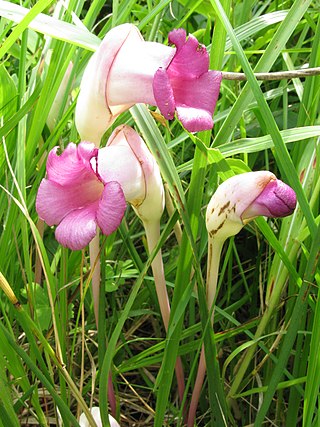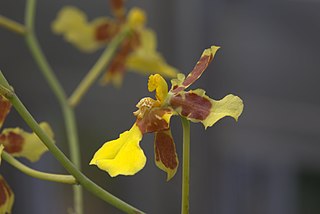
Joseph Marie Henry Alfred Perrier de la Bâthie was a French botanist who specialized in the plants of Madagascar.

Muehlenbeckia or maidenhair is a genus of flowering plants in the family Polygonaceae. It is native to the borders of the Pacific, including South and North America, Papua New Guinea and Australasia. It has been introduced elsewhere, including Europe. Species vary in their growth habits, many being vines or shrubs. In some environments, rampant species can become weedy and difficult to eradicate.

Lepechinia is a genus of plants in the mint family, Lamiaceae. It includes several species of plants known commonly as pitchersages. Plants of this genus can be found in Central and South America, Mexico, California, Hispaniola, and Hawaii, although the species in Hawaii is probably a human introduction. Many of them bear attractive pitcher-shaped flowers, often in shades of purple. The genus was named for the Russian botanist Ivan Ivanovich Lepechin. In 2011, the two monotypic genera Chaunostoma and Neoeplingia were shown to be part of Lepechinia.
Julian Alfred Steyermark was a Venezuelan American botanist. His focus was on New World vegetation, and he specialized in the family Rubiaceae.

Laennecia or Laënnecia is a genus of flowering plants in the family Asteraceae. The plants are native to Mesoamerica, South America, and the southwestern United States. Common name is "horseweed."
Heterorhachis is a genus of South African flowering plants in the family Asteraceae.
Arthur Francis George Kerr (1877–1942) was an Irish medical doctor. He is known particularly now for his botanical work, which was important for the study of the flora of Thailand.

Agiortia is a small genus of flowering plants in the family Ericaceae.
Parodiophyllochloa is a genus of Latin American plants in the grass family.
Perrierodendron is a genus of trees and shrubs in the family Sarcolaenaceae. They are endemic to Madagascar.

Aeginetia is a genus of plants in the broomrape family Orobanchaceae, native mostly to tropical Asia and also Cameroon.

Vitekorchis is a genus of flowering plants belonging to the family Orchidaceae.
Tzveleviochloa is a genus of flowering plants belonging to the family Poaceae.
Tirpitzia is a genus of flowering plants belonging to the family Linaceae. It is also in the subfamily Linoideae.
Tamayorkis is a genus of flowering plants belonging to the family Orchidaceae.
Gilesia biniflora is species of flowering plant belonging to the family Malvaceae. It is commonly known as the 'western tar-vine'. It is the sole species in genus Gilesia. It is in the Byttnerioideae subfamily.
Mossia is a monotypic genus of flowering plants belonging to the family Aizoaceae. It only contains one known species, Mossia intervallaris.

Reedia is a monotypic genus of flowering plants belonging to the family Cyperaceae. It only contains one known species, Reedia spathacea, endemic to south-western Australia.








